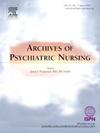Experiencing transformation: Emerging adults, food, and mood—A phenomenological analysis
IF 2.2
4区 医学
Q1 NURSING
引用次数: 0
Abstract
Mental health concerns have become increasingly prevalent among young adults. A growing body of literature indicates that increasing plant intake shows benefits for mental health. An existential-phenomenological study was conducted with 11 emerging adults with symptoms of anxiety and/or depression who had adopted a whole-food, plant-based diet (WFPB) diet to understand their lived experiences. Adoption of a WFPB diet was about Experiencing Transformation: An “Internal Calling.” The context of transformation was the experience of Going Against the Grain of Society. Six figural themes were identified: (a) Embracing Food as Medicine: “Healthy from the inside out,” (b) Benefiting from a Holistic Approach: “Feeding your body is feeding your soul and is feeding your mind,” (c) Adopting a Lifestyle Change and Its Evolution Over Time: “Getting older and realizing what you need,” (d) Finding Time for “The Joy of Cooking,” versus Time Constraints, (e) Fostering Community: The “Community-Building Power of Food,” and (f) Following the Call: “I'm motivated by my moral compass.” For nurses, primary care nurse practitioners, and psychiatric mental health nurse practitioners, a holistic approach, including an anti-inflammatory diet, could be key for managing symptoms of anxiety and depression among emerging adults.
体验转变:新生成人、食物和情绪——现象学分析
心理健康问题在年轻人中越来越普遍。越来越多的文献表明,增加植物摄入量对心理健康有益。一项存在现象学研究对11名患有焦虑和/或抑郁症状的新兴成年人进行了研究,他们采用了全食物植物性饮食(WFPB)饮食来了解他们的生活经历。采用WFPB饮食是为了体验转变:一种“内在的呼唤”。转型的背景是《逆社会潮流》的经历。确定了六个数字主题:(a)将食物视为药物:“由内到外的健康”;(b)受益于整体方法:“喂饱你的身体就是喂饱你的灵魂,也就是喂饱你的思想”;(c)改变生活方式及其随时间的演变:“变老并意识到你需要什么”;(d)为“烹饪的乐趣”寻找时间,而不是时间限制;(e)促进社区:“食物的社区建设力量”;以及(f)响应号召:“我的道德准则激励着我。”对于护士、初级保健护士从业人员和精神科心理健康护士从业人员来说,包括抗炎饮食在内的整体方法可能是管理新兴成年人焦虑和抑郁症状的关键。
本文章由计算机程序翻译,如有差异,请以英文原文为准。
求助全文
约1分钟内获得全文
求助全文
来源期刊
CiteScore
3.70
自引率
0.00%
发文量
131
审稿时长
160 days
期刊介绍:
Archives of Psychiatric Nursing disseminates original, peer-reviewed research that is of interest to psychiatric and mental health care nurses. The field is considered in its broadest perspective, including theory, practice and research applications related to all ages, special populations, settings, and interdisciplinary collaborations in both the public and private sectors. Through critical study, expositions, and review of practice, Archives of Psychiatric Nursing is a medium for clinical scholarship to provide theoretical linkages among diverse areas of practice.

 求助内容:
求助内容: 应助结果提醒方式:
应助结果提醒方式:


